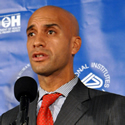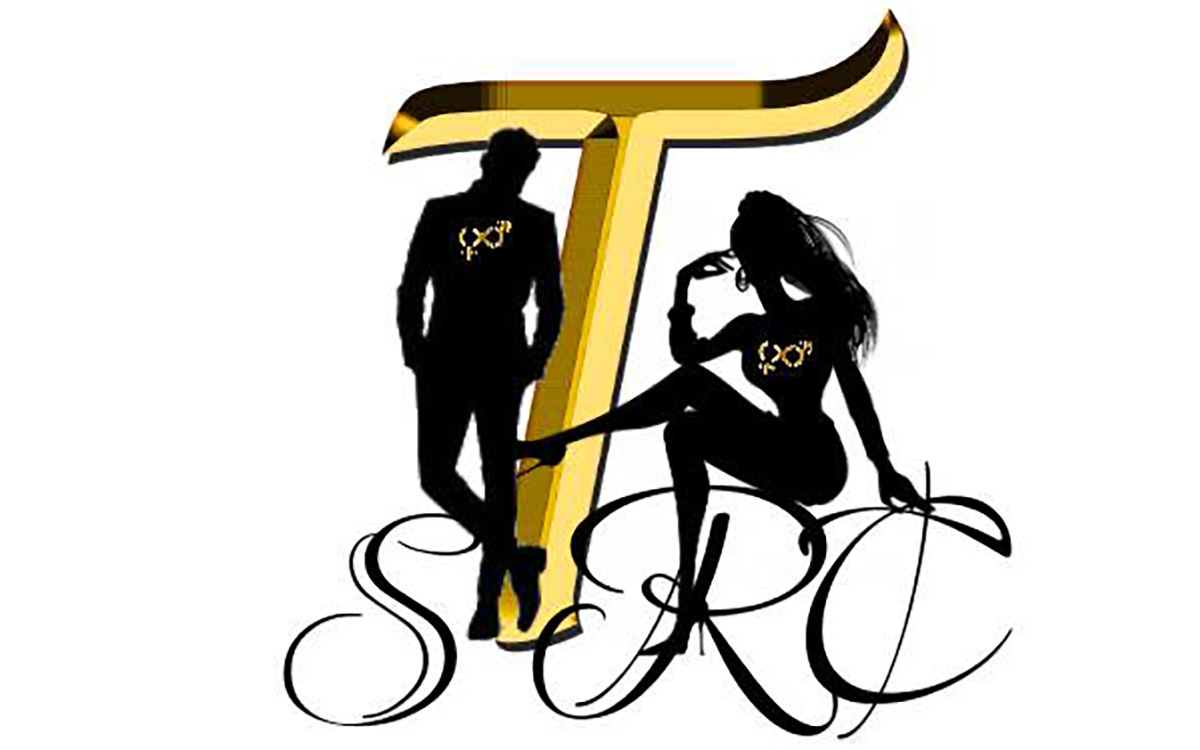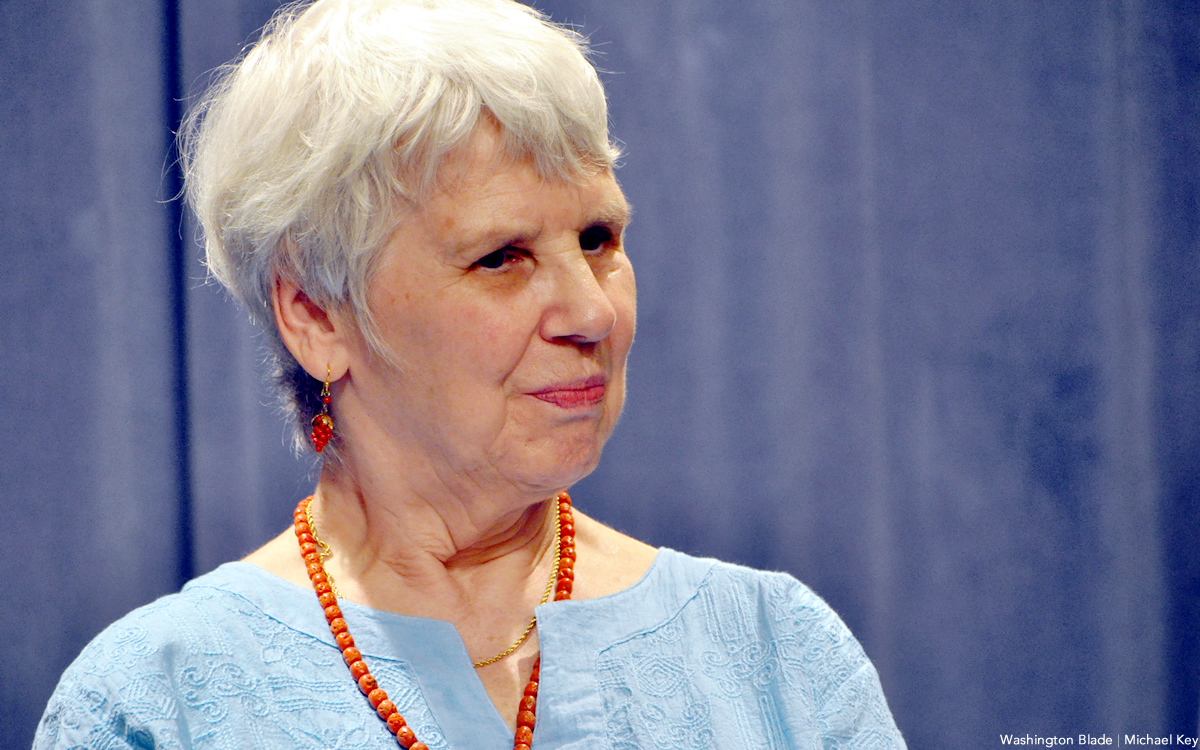Local
Activists call on Fenty to ‘restore’ police liaison unit
Letter to mayor cites recent anti-LGBT attacks

Several local LGBT organizations have sent Mayor Adrian Fenty an open letter asking him to overrule the city’s police chief, Cathy Lanier, by directing her to upgrade the headquarters staff at the police department’s Gay & Lesbian Liaison Unit.
Gays and Lesbians Opposing Violence, the D.C. Center for the LGBT Community, the Gay and Lesbian Activists Alliance, and the Gertrude Stein Democratic Club cited in the Aug. 26 letter a recent surge in anti-LGBT assaults in the city as demonstrating the need for strengthening the GLLU through an expanded staff.
“In light of this continuing history of violence against members of our community, we seek your immediate attention to fully restore the staffing levels of the GLLU to six full-time officers,” the groups said in the letter.
“Further, we ask that the unit be led by a full-time officer devoted to these duties with the authority to report directly to Chief Lanier. It is our hope that a restored GLLU will serve as a more effective liaison between the LGBT community and MPD,” the letter says.
The letter emerged from an Aug. 26 town hall meeting on anti-LGBT violence sponsored by the D.C. Center. Several people attending the meeting expressed support for a suggestion by gay activist Peter Rosenstein that activists stage a sit-in protest in Fenty’s office to dramatize the need for immediate action on his part to strengthen the GLLU.
Rosenstein said this week that he has no immediate plans for a mayoral protest or sit-in but said such an action would be considered sometime later.
GLOV co-chairs Kelly Pickard and Joe Montoni briefed town hall meeting attendees on some of the recent incidents of anti-LGBT violence, including about a half-dozen incidents in the Dupont Circle area near several gay bars. The two said they were especially troubled over the murder last month of gay federal worker Delando King, who was stabbed to death in his apartment near Massachusetts Avenue and 10th Street, N.W.
Police have charged a 24-year-old D.C. man with first-degree murder in connection with the case, and court documents filed by police say King appears to have invited his attacker home after meeting him in a gay bar.
GLOV co-chair Montoni said the group believes King’s murder should be listed as a hate crime, even though police have said the motive appears to have been robbery. GLOV praised police investigators for working with the GLLU to make an arrest in the case within a week of the murder.
The GLLU currently has four full-time officers, an increase from two years ago, when the unit’s staff dropped to just one or two officers due to attrition and a decision by Lanier to restructure and decentralize it.
Lanier has said budget cuts and the need for more officers on street patrol duty forced her to reduce the number of officers at the GLLU’s headquarters office in Dupont Circle from its high point in 2007 of six full-time officers and a full-time sergeant who served as its supervisor. The current GLLU supervisor, Sgt. Carlos Mejia, divides his duties between the GLLU and the department’s Latino Liaison Unit.
With the backing of Fenty, Lanier decentralized the GLLU and three other specialized police units working with the Latino, Asian American, and deaf and hard of hearing communities by establishing affiliate members of the units in each of the department’s seven police districts.
Officials with GLOV and other LGBT activists have expressed general support for the affiliate program, in which officers assigned to regular patrol duties are trained to respond to calls involving LGBT-related crimes. Lanier said there are currently about a dozen GLLU affiliate members in addition to the four full-time members.
But GLOV and other local LGBT groups have expressed concern that the affiliate members don’t have the time or expertise to handle all of the LGBT-related calls for police help, including calls related to hate crimes.
“Having affiliate officers trained to recognize and respond to LGBT crimes in every district is admirable in intent,” the groups said in their letter to Fenty. “In practice, however, not having officers dedicated to the GLLU full-time has led to, in our opinion, diminished effectiveness in recognizing and responding to bias crimes. We ask that you fully restore staffing to the GLLU and grant the officer in charge with direct reporting to Chief Lanier.”
The mayor’s office did not respond to a request for comment by press time.
In an interview with the Blade two weeks ago, Fenty said he has full confidence in Lanier’s handling of the GLLU restructuring, saying she has succeeded in reducing overall crime rates in the city during her tenure as chief.
“You want law enforcement putting together strategy for keeping people safe,” Fenty said. “You don’t want civilians and you especially don’t want politicians to be the ones who are developing those strategies. And I think Chief Lanier has done a great job doing that.”
Virginia
Norfolk transgender resource center vandalized
Anti-trans graffiti spraypainted onto Southeastern Transgender Resource Center’s windows

The Norfolk Police Department is investigating the vandalism of a transgender resource center’s building.
Tarena Williams, founder of the Southeastern Transgender Resource Center, told WAVY that someone spraypainted anti-trans graffiti on the windows of her organization’s offices on Sunday or Monday morning. Williams told the Hampton Roads television station that seeing the messages was like “walking into hell.”
“I opened up STRC, even the Lamina House,” she told WAVY. “I opened up that to get away from those types of words. This is a place you can come to get away from that, but to see that sprayed over the window. It’s kind of like you are walking into hell. … To be honest, I was like in shock.”
Authorities are investigating the vandalism.
West Virginia
Appeals court strikes down W.Va. transgender athlete ban
Ruling finds law violates students’ constitutional rights, Title IX

BY LORI KERSEY | The 4th U.S. Circuit Court of Appeals has struck down West Virginia’s ban on transgender athletes, finding the law violates trans students’ rights under the Equal Protection Clause of the constitution and Title IX, a federal civil rights law prohibiting discrimination based on sex in education programs.
The case, B.P.J. vs. the West Virginia Board of Education, was filed in May 2021 on behalf of Becky Pepper-Jackson, a 13-year-old trans middle school student and track athlete who would be barred from participating if the ban is upheld. Pepper-Jackson is represented by the American Civil Liberties Union, the American Civil Liberties Union of West Virginia and Lambda Legal.
In April 2021, West Virginia Gov. Jim Justice signed into law a bill prohibiting trans women and girls in the state from participating in sports that align with their gender identity. The U.S. Court of Appeals in February 2023 blocked the state from removing Pepper-Jackson from her school’s track and field team as legal advocates appealed a lower court’s ruling upholding the ban.
In Tuesday’s ruling, Judge Toby Heytens wrote that offering Pepper-Jackson the “choice” between not participating in sports and participating only on boys teams is not a real choice.
“The defendants cannot expect that B.P.J. will countermand her social transition, her medical treatment, and all the work she has done with her schools, teachers and coaches for nearly half her life by introducing herself to teammates, coaches and even opponents as a boy,” the judge wrote.
“By participating on boys teams, B.P.J. would be sharing the field with boys who are larger, stronger, and faster than her because of the elevated levels of circulating testosterone she lacks,” he wrote. “The Act thus exposes B.P.J. to the very harms Title IX is meant to prevent by effectively ‘exclud[ing]’ her from ‘participation in’ all non-coed sports entirely.”
In a statement Tuesday, Joshua Block, senior staff attorney for the ACLU’s LGBTQ and HIV Project, called the court’s ruling “a tremendous victory for our client, transgender West Virginians and the freedom of all youth to play as who they are.”
“It also continues a string of federal courts ruling against bans on the participation of transgender athletes and in favor of their equal participation as the gender they know themselves to be,” Block wrote. “This case is fundamentally about the equality of transgender youth in our schools and our communities and we’re thankful the 4th Circuit agreed.”
“We hope today’s ruling sends a message of hope to the trans youth of West Virginia,” Aubrey Sparks, legal director of the ACLU of West Virginia, said in the statement. “And a message of warning to politicians who continue to dehumanize this vulnerable population.”
West Virginia is one of 21 states that have banned trans student-athletes over the last three years, according to the ACLU.
In a statement Tuesday, West Virginia Attorney General Patrick Morrisey vowed to defend the ban and said he is “deeply disappointed” in the decision.
“The Save Women’s Sports Act is ‘constitutionally permissible’ and the law complies with Title IX,” Morrisey said. “I will keep fighting to safeguard Title IX. We must keep working to protect women’s sports so that women’s safety is secured and girls have a truly fair playing field. We know the law is correct and will use every available tool to defend it.”
******************************************************************************************

Lori Kersey is a reporter with a decade of experience reporting in West Virginia. She covers state government for West Virginia Watch.
******************************************************************************************
The preceding article was previously published by the West Virginia Watch and is republished with permission.
Nonprofit, nonpartisan, independent journalism not hidden behind a paywall. Mountaineers are always free, and so is West Virginia Watch.
West Virginia Watch is part of States Newsroom, the nation’s largest state-focused nonprofit news organization.
District of Columbia
Reenactment of first gay rights picket at White House set for April 17
Event marks 59th anniversary of historic push for gay rights in nation’s capital

D.C.’s Rainbow History Project announced it will hold a reenactment on Wednesday, April 17, of the historic first protest for gay rights in the form of a picket line in front of the White House that took place on that same day in 1965.
In a statement released last week, Rainbow History Project says the reenactment will mark the 59th anniversary of an event that is credited with bringing attention for the first time to the federal government’s longstanding discrimination against a minority group referred to then as homosexuals or gays and lesbians.
The statement notes that the 1965 event was organized by the Mattachine Society of Washington, D.C., the first politically active LGBT organization in the nation’s capital founded by local gay rights pioneer Frank Kameny.
“The picket took place on the White House sidewalk, Lafayette Park, 1600 Pennsylvania Ave., on April 17, 1965,” the statement says. “For exactly one hour, from 4:20 p.m. to 5:20 p.m., members of the Mattachine Society of Washington walked in a circle, non-stop, in silence, carrying posters of their demands,” the statement continues.
“The White House picket is the origin story for public demonstrations for gay rights in the U.S., and the origin story for Pride Marches and the annual LGBTQ Pride celebrations which occur across the globe,” according to the statement.
It says those picketing in the April 1965 event, which included Kameny and longtime local D.C.-area lesbian activist Lilli Vincenz, both of whom held doctorate degrees, called on the government to adopt the Mattachine Society of Washington’s four major demands: an end to the exclusion of homosexuals from federal government employment; an end to the ban on gays and lesbians from serving in the U.S. military; an end to the “blanket denial” of security clearances for gay people; and an end to the “government refusal to meet with the LGBTQ community.’
Among those who chose not to respond to the request for a meeting was President Lyndon B. Johnson, who occupied the White House at the time of the 1965 picketing.
Vincent Slatt, the Rainbow History Project’s director of archiving and one of the lead organizers of the April 17 reenactment event, said the event is aimed, among other things, at drawing attention to how far the LGBTQ community has come since 1965. He said the event is not in any way a protest of the administration of President Joe Biden and Vice President Kamala Harris, who Slatt called staunch supporters of the LGBTQ community.
“We are just reenacting this historical event and pointing out how far we’ve come,” Slatt told the Washington Blade. “If you think about what it means in 1965 when these people were protesting and LBJ would not even respond to them. And now, we are at a place where Vice President Harris speaks on a stage at Capital Pride.”
The Rainbow History Project statement notes that the reenactment event will also be held in honor of Kameny, who died in 2011, and Vincenz, who passed away in 2023, both of whom participated in a similar reenactment event in 2008.
Among those who will be participating in this week’s reenactment on April 17 will be longtime local LGBTQ rights activist Paul Kuntzler, who is the only known surviving person who was among the White House picketers at the April 1965 event. Kuntzler will be carrying a replica of his own picket sign he held at the 1965 event, the statement says.
It says Rainbow History Project volunteers will also carry replicas of the original protest signs and hand out literature explaining the picket to passersby and tourists.
Similar to the 1965 event, the reenactment picketing at the White House will begin on April 17 at about 4:15 p.m., according to Slatt of the Rainbow History Project.





















